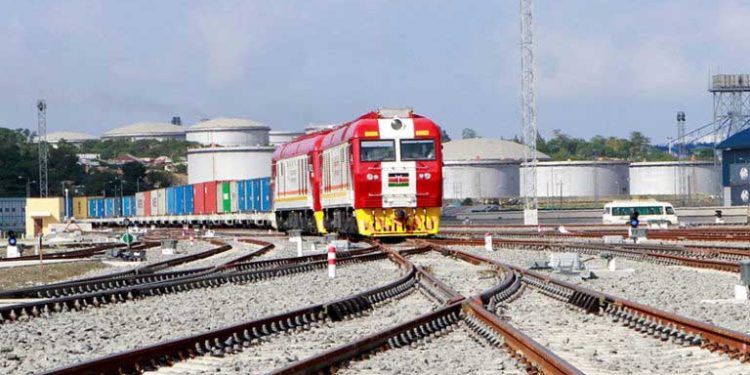The cancellation of vessels scheduled for Mombasa port between February and March 2020 due to COVID-19 pandemic affected the port’s total cargo throughput and in turn the freight volumes handled by SGR.
Import containers railed from Mombasa port to Nairobi Inland Container Depot in Embakasi went down from 334,110 tons recorded in January to 256,033 tons in February. It further declined to 219,813 tons in March 2020.
Exports moved by rail also experienced a slight decline from 41,719 tons in January to 39,653 tons in March 2020. The decline was due to restrictions imposed to export markets, especially in Europe following the Corona virus pandemic outbreak.
Kenya Railway handled 242 cargo trains from Mombasa to Nairobi, declining down to 210 in February. In the month of March and April, the state corporation handled 148 and 187 cargo trains respectively.
This compares poorly to the peak Month of July last year, when the SGR handled 258 trains to Nairobi alone with 165 returning to Mombasa. This saw a total of 335,696 tonnes of cargo moved to Nairobi during the month of July.
In the month of April, volume of imports through SGR recorded a significant increase from 219, 813 to reach 289,291 tons in April. This increase in volumes in April is attributed to the opening up of economies in East Asia and Europe after managing to combat the COVID-19 pandemic which had led to shutting down of industries in these regions, according to brief notes Shippers Council of East Africa presented in virtual meeting organized by Africa Logistics Properties (ALP) to discuss the New Normal in Logistics Chain, Cross Border Trading and Shipping in the East African Region.
Covid 19 pandemic is expected to affect the total Cargo throughput at the Inland Container Depot this year, which grew by 61.1 per cent from 257,972 TEUs in December 2018 to 415,650 TEUs in 2019. This growth was attributed to the directive to have all the Nairobi bound containerized cargo to be ferried by SGR.
The role of Naivasha as a tool to address congestion along the Northern Corridor came into sharp focus during the meeting since the region has not created all the necessary infrastructure to help transit cargo use the facility at a time when the truck using the route have seen an increase in turnaround time
In the latest move to attract shippers to use the Inland Container Depot (ICD) from Mombasa to Naivasha, Kenya Railways reduced freight charges from $600 to $480 for a 20-foot container and from $850 to $680 for a 40-foot container.
Good roads, housing to accommodate ICD users and other supportive infrastructure such as warehouses are needed to allow logistic players use the facility for transit cargo.
Importers, according to Langat, would order raw materials for use for 3 months but following disruption of Covid 19, the need to order material for up to six months is increasingly becoming necessary, which calls for more storage space.
According to Richard Hough, the Chief Executive Officer of ALP, if supportive infrastructure and the country can guarantee the market sustainability, ALP would consider investing in modern warehousing in the region.
“We would absolutely take the demand. But since warehousing is an intensive capital venture, the issue of sustainability is critical,” Hough noted, adding that the company has now introduced short term lease measures to meet the demand brought about by Covid 19 pandemic.
Added he; “We need to understand the rules that will make the venture successful. We are looking at the sustainability of the relations between Kenya and its neighbours. It is an area we would look forward to investing in.” Hough said.
ALP recently announced plans to construct a one-million square feet storage facility in Nairobi. In 2018 ALP completed another within the Tatu Industrial Park, Ruiru, about 22km north of Westlands or 3 km from the Northern and Eastern bypass junction.
Last month, the Kenya Railway started moving transit cargo to the Naivasha ICD. To encourage the use of Naivasha ICD by transit countries, KPA gave the importers 30 free storage charges and extended transit import from 9 days to 14 and transit Export Containers from 15 days to 20d ays effective, May 18, 2020, for a period of 20 days.
However, the stakeholders find the 90 days insufficient to help them make strong decisions of investing in Naivasha due to other associated costs such as the last mile transport that eventually make rail transport more costly than road.





